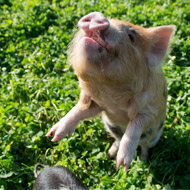
Researchers believe talent relates to how they are kept
Kune Kune pigs learn from each other and can remember demonstrated techniques, new research suggests.
The study, published in the journal Animal Behaviour, found that free-ranging Kune Kune piglets watch and copy tasks demonstrated by their mother or aunt. Furthermore, researchers found that Kune Kune piglets can recall observed tasks up to 24 hours later.
In the study, researchers sought to demonstrate social learning through the "vertical transmission of information" - i.e. passing on of knowledge to the next generation. The task involved opening the sliding door of a box to get a piece of food. The pigs could use their snout to move the door into one of thee positions: left, right or middle.
Eighteen piglets were divided into three groups. While two groups observed their mother or aunt as they used the opening techniques, the third group had to work out the task without observation. This ensured there was no predisposition or bias regarding the movement of the sliding door.
Researchers found that the non-observer piglets used all possible techniques to open the door, confirming there was no predisposition or bias. Conversely, the observer piglets displayed learning behaviour through observation.
Interestingly, the piglets produced the best results when they were not tested for the learning effect until the next day. The researchers said that only rarely, and never before among pigs, has this remarkable behaviour been demonstrated among animals.
The authors of the study believe the talent for social learning among Kune Kune pigs relates to how they are kept:
“The pigs live in natural family groups under free-ranging conditions. This appears to trigger an existing aptitude for social intelligence among these animals,” the authors write. “It would be worthwhile to consider the positive effects of learning from older animals in commercial pig farming, for example when making improvements to the housing conditions.”
The study, Object movement re-enactment in free-ranging Kune Kune piglets, was led by the University of Veterinary Medicine, Vienna.



 The Federation of Independent Veterinary Practices (FIVP) has announced a third season of its podcast, Practice Matters.
The Federation of Independent Veterinary Practices (FIVP) has announced a third season of its podcast, Practice Matters.